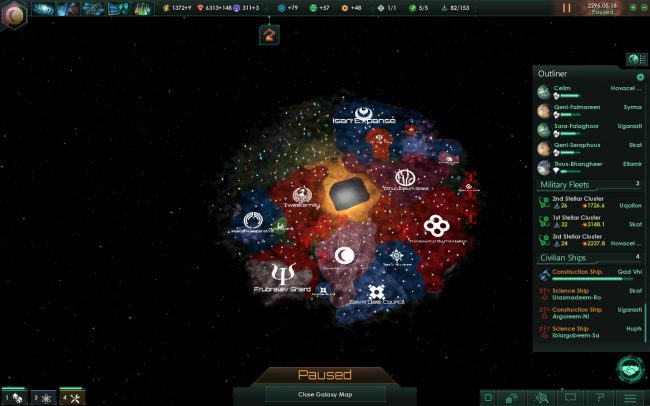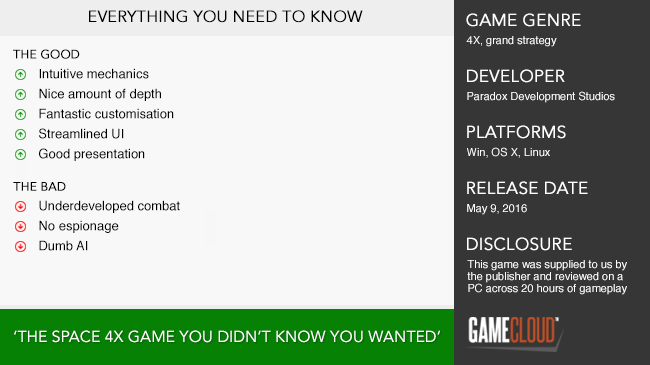
4X games are one of those things that you either sink your life into or brush aside. There’s rarely a grand strategy game you can come in and out of, probably because grand strategy doesn’t lend itself to a time-poor lifestyle. Unfortunately, time-poor is the most fitting description of my life, so it’s refreshing to see a 4X game that is both accessible and lenient towards my uni projects getting finished. Don’t worry if you want to dedicate your life to the game, though; Stellaris certainly caters to the egotistical megalomaniac inside us all. It all starts with creating your race, and it’s very telling of the rest of the game.
Before you fly off into the void of space, you need to decide how your people look, act and feel. Now, you could just go ahead and pick one of the pre-made races on offer, or you could embrace your new god-like position and make a species of war-toting, spiritualist mushrooms. The game allows you to define almost every aspect of your race, including how it treats its elections and its underlings. The game lets you be who you want to be from the ground up, which is great because there’s a fantastic amount of roleplaying to the game.

Once you’ve decided who your people are (and whether or not they love slavery), you start the game with one planet and a dream. As you expand outwards, notifications will appear for events and anomalies that you can interact with in ways consistent with your race’s ideology. For instance, the reaction to finding a new alien race when playing as a Xenophile is very different to playing a Fanatic Xenophobe. These earlier choices can open up (or close off) some different options in the game, which is a fantastic way to make these choices more meaningful. Depending how you respond to events, you’ll also get new missions to pursue
As your borders grow and your mineral count skyrockets, you’ll start to notice that the interface is very, very good. It’s streamlined and easy to extract information at a glance, and the outliner lets you quickly select everything important without having to go searching. However, if you’re playing on a smaller screen (say, just a random example, 1440×900), the display will get pretty crowded, but this is a minor issue. After appreciating the UI, you’ll start to encounter other intelligent lifeforms in the galaxy, and then the game’s problems start setting in.

After the early game finishes and borders are set (more or less), you’ll come to learn that Stellaris is a politically-driven game. You have a unique resource called influence that you can only gain through very specific tasks or technologies, but its uses are incredibly powerful. One such use is to recruit leaders to give your units/planets buffs. Its other primary purpose is to create sectors, small districts of your region that do their own thing so you can stay focused on the bigger picture. Now, leaders is an okay system to engage in, but sectors might throw people off.
If there’s one design choice I’m conflicted about, it’s sectors. On the one hand, yes, it would be a nightmare to manage all the planets you own, but you have to relinquish control after a set number of planets as defined by your government in race creation. It’s good that the option to hand the micromanagement over to the AI exists, but making it mandatory could be a major con for anyone who wants to have absolute control over their empire. The other half of this politically fueled adventure is interacting with other intelligent beings, which is both good and bad.

When you start running into other space-faring empires, the necessity for diplomacy will kick in. For the most part, diplomacy works like most other 4X’s, and that’s about it. There’s a few unique options for Stellaris, such as demanding them to become your vassal, but it’s nothing special. I also haven’t played a game where the diplomacy menu has worked 100% flawlessly, not to mention the idiotic and easily manipulable AI. Considering how important politics is, this is not the place you want to have flaws ruining an otherwise great game. Naturally, diplomacy will fail you because nobody seems to like you slaving their populace, but war needs a bit of work too.
When war approaches, it’s one of the most terrifying and exciting times in any 4X game, but Stellaris has a few issues. Combat is hugely underwhelming because it’s wholly a numbers game, it happens too quickly, and the combat AI is utterly braindead. My friend assured me that the AI got smarter as you researched combat tech, but honestly, they were incapable of tactical thought for most of the game. You can’t even control ships in battle, which makes more sense in a game like Europa Universalis where units are hundreds of troops, but not here. The other big problem is the absence of any espionage mechanics.

Sun Tzu understood that spies are the key to any successful encounter, but there’s none to be seen in the galaxies of Stellaris. A lack of espionage, to me, is shocking. With a tech system that focuses on random outputs over a set tree, a spy system seems perfect to exploit your enemies’ knowledge. Even more worrying is that ship weapons have a counter system, but without the presence of spies, you just have to guess what combination will work best against your opponents’ fleets. It’s a mechanical nirvana that hasn’t been leveraged, and it’s a damn shame, but at least the game looks okay.
Towards the latter stages of the game you begin to realise, even though it’s not the main selling point, everything looks pretty decent. The black holes and pulsars look great, and everything does a good job of reflecting its real world counterpart (apart from the aliens, of course). On top of that, the music is outstanding, setting the tone of the game while also being listenable for hours on end. It’s not groundbreaking stuff, but when most of your time is spent knee deep in UI, it doesn’t matter.

The last thing I need to mention is how accessible the game is. Even if you’re a person with barely any time to play a grand strategy game, Stellaris offers something much less intimidating the previous Paradox releases. The accessibility, I think, is mainly due to the tutorial system, which teaches you how to play as you play instead of trying to explain the game through walls of text (like Hearts of Iron 3). So, when you eventually lose to the AI because the federation leader got rid of your fleet, you won’t hesitate to make a new race and start again.

Overall, Stellaris delivers a 4X game that is not only approachable but hugely enjoyable. As it stands, some mechanics need to be added, and sectors might make you mad, but it’s still a thoroughly enjoyable game as it is. If you’ve ever felt like checking 4X games out but been overwhelmed by their complexity, this is the game you’re looking for. If you want to play the most bitchin’ race of mushroom slavers this side of the Kappa belt, this game is also for you, but maybe you should rethink your values. Trust me, doesn’t pay off late game. Friggin’ bird-people and their morals. Disgusting.











